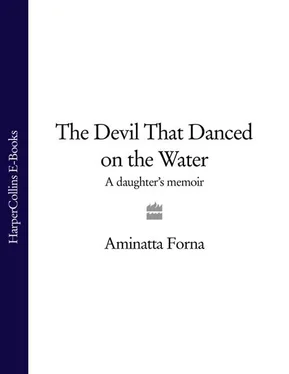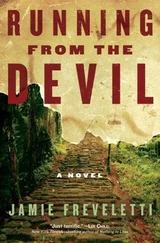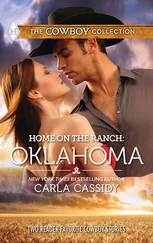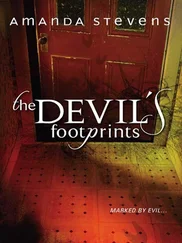We sailed on the passenger ship the Aureol. It docked in the Canaries, where the crew filled the pool on the deck with sea water; then we set sail for Freetown. The other passengers were mostly returning former colonials, who played cards, organised a fancy dress party and sat at each other’s tables in the evening without ever inviting us to join them.
When the ship docked alongside the massive warehouses of the Queen Elizabeth II quay, the first thing my mother saw was the fedora belonging to my father’s friend Dr Panda bobbing in the surging crowds. She stepped off the boat and into the throng of Africans and she was transformed, once again, into a white woman.
In Freetown people stared at her wherever she went, especially when she rode by on her bicycle. ‘Look! White woman dae ride bicycle!’
White again, my mother was accepted, on certain conditions, into the ex-pat community in Freetown. She joined a Scottish dancing group that met at the Railway Club and at the exclusively white Hill Station Club. Before independence black people were not even allowed up to Hill Station unless they worked in one of the big houses. A special train was sent down every day to bring the workers up to the hills. Certainly, there were no African members of the Hill Station Club. My mother was popular there: she had grown up performing songs and dances and she entranced everyone with her outgoing personality. Her only disappointment was that at the end of the evening the other members never invited her to their houses for drinks or supper, and she made her way home alone.
Marriage to my father turned my mother into a multi-hued chameleon. He, by contrast, had been a black man in Scotland and was a black man in Africa. Once I asked my mother how my father regarded her patronage of the Hill Station Club. She said she didn’t know.
‘What if he’d wanted to come too?’ I pressed.
‘Well, he wouldn’t,’ she replied. ‘He didn’t know the Scottish dances.’ That was the way she thought about these matters. It was as simple as that.
My father’s visiting brothers were kind to her, especially Uncle Momodu. He had an appetite for all things western and always wore western clothes. He came down to Freetown ‘on business’, he stated enigmatically, and, when he wasn’t at one of his assignations, he flicked through the magazines my mother brought with her from Britain, questioning her about life ‘over there’. Momodu wandered in and out of the house, played with the babies and loved to tease his serious younger brother’s wife. But Maureen felt frozen out by the wives of my father’s friends who, she thought, disregarded her, though she could never quite put her finger on the problem because it lay in what was missing from their welcome rather than what was present.
Soon after we arrived Pa Roke, my grandfather, came to visit, bringing with him several live chickens, some sacks of rice and one of his junior wives. He cast an eye over my mother: ‘So you went to the sea and turned into a fish,’ he said to my father in Temne. He’d warned his son not to come back with a white wife. There were a lot of local families who would have liked to make a match. ‘How much did you pay?’ He meant how much was the dowry. She was young; her breasts hadn’t fallen yet.
‘Ten shillings,’ my father replied straight faced. That was what he’d been charged at the register office on the morning of the wedding. Pa Roke smiled: he was pleased. His son’s wife might be white, but she had come at a good price.
In Koidu as we passed people waved and called out to my mother and me. Young men offered to carry her packages; shopkeepers ushered her over to look at the latest imported fabrics. Everyone recognised her. She was the doctor’s white wife. And there was only one white woman in Koidu. And only one doctor.
A few months after our clinic opened a battered bush taxi drew up in front of the house. There were quite a few people crammed inside; at first it was difficult to see exactly how many. They struggled out, among them a woman so emaciated and feeble that she couldn’t walk, as well as a boy of around eight or nine who looked as if he were unconscious.
Our father came out and helped carry them into the surgery; it was obvious he was upset and angry: ‘Why do you bring them to me when it’s too late?’ No one replied. And he knew the answer: they had nothing, there was no way to pay a doctor.
The woman was close to death. The boy, who was perhaps her son, had died in the back of the car a short while before: his body was still limp, no signs yet of rigor mortis. My father asked the family about the woman’s and the boy’s symptoms. Were there others? They nodded. Yes, they replied, there were many others in the village, too ill to make the journey.
My father didn’t have a laboratory but it took him less than a minute to reach his diagnosis: what the people described was a cholera epidemic. He took his bag, swept up armfuls of drugs, threw them all onto the front seat of our Austin and left. The family sat in the back giving him directions to their village, cradling the body of the small boy wrapped in a sheet.
My father didn’t come back until much later that night, until after he had traced the source of the contamination and persuaded the village headman to stop people using the water. It was never easy; there was often only one well or stream; people didn’t understand the basic principles of infection, spread and cure. Outbreaks of disease were almost always blamed on witchcraft. He taught them how, at the first sign of diarrhoea they should shake the gas out of a bottle of Fanta or Coca-Cola and drink it at room temperature. It was a simple trick: the equivalent of sugar and salts. But it was a life-saver.
When my mother was alone in the city and our father was in the regions planning the clinic, a measles epidemic gripped Freetown. In Britain measles is an ordinary childhood illness; in Africa the same virus kills as recklessly and easily as a child tumbling a tower of wooden blocks. That year hundreds of children died. At Connaught Hospital they didn’t have space to admit any new cases. All three of us children were infected; spots even erupted down the inside of my brother’s throat. My father wasn’t due back for many days and there were no telephones up-country, no way to reach him. So my mother nursed us at home, letting us sip flat Fanta when we were too weak to eat anything else.
Eventually a colleague of our father’s was reached and he drove over to see us. He put my brother on a drip and told my mother she had done just the right thing. She was so relieved when we began to improve after ten days that she ran across the road to Patterson Zochonis, the expensive and only department store in Freetown, where she bought us absurdly expensive Swiss maraschino cherry ice cream, and spooned it down our tender throats one by one.
In Koidu there was so much to do and no other doctors with whom to share the load. The building of this clinic was the realisation of a simple dream for our father. Many of the western-trained doctors preferred to stay in Freetown and work in the larger hospitals. With a modest private practice on the side within a few years they could own a Mercedes and be waited upon by servants wearing white gloves, like Dr Panda and his wife. But our father had a vision that one day there would be a network of cottage clinics across the country. The success of our clinic was important to him and his motives were plain.
When our father was a child during the war, a vaccination programme was announced. Scores of families left their villages to make the trip to the mission hospital. They settled on the rows of long wooden benches under the sun in the courtyard, alongside patients who arrived with other complaints. When the benches were full, the line continued along the walls and encircled the building. My father sat for hours on the ground, his back against the wall, listening for his name to be called. In front of him in the queue was an old man. When the Fornas appeared, the old man asked for help going to the toilet and he gave my father some cola nuts in thanks afterwards.
Читать дальше












